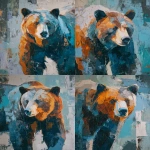Explore the Best AI Image Gallery

Unlocking Creativity: SaaS Solutions Transforming the Business Landscape
In recent years, software as a service (SaaS) has emerged as a prominent model that is reshaping how businesses operate across various sectors. SaaS offers convenient, subscription-based access to software that can enhance productivity and foster innovation. This blog post delves into the impact of SaaS solutions on businesses, with a particular focus on their role in the creative industry, potential applications, ethical considerations, and the future of this transformative technology.
Understanding SaaS Solutions
SaaS solutions are cloud-based services that provide software applications over the internet. Unlike traditional software that requires installation on local devices, SaaS applications allow organizations to access tools securely via the web. This model offers numerous advantages, including:
- Cost Efficiency: Lower upfront costs as businesses pay for subscriptions rather than purchasing licenses.
- Scalability: The ability to easily adjust service levels according to the organization's needs.
- Accessibility: Users can access applications from anywhere, promoting remote work possibilities.
- Automatic Updates: Continuous improvements and new features are automatically made available without disrupting operations.
Impact on the Creative Industry
The creative industry has seen profound changes due to the proliferation of SaaS solutions. From design to media production, SaaS applications enable artists and creators to harness advanced technologies for their projects. For instance, tools like Adobe Creative Cloud have transformed traditional design workflows, allowing for seamless collaboration and real-time feedback among teams across geographical barriers.
Collaboration and Innovation
SaaS tools facilitate enhanced communication and collaboration among creative teams. Platforms like Canva, which provides easy-to-use design templates, democratize access to design services, enabling non-designers to create visually appealing content. Such tools encourage innovation by allowing anyone within the organization to contribute creatively, thus broadening the scope of ideas and executions possible.
Potential Uses of SaaS Solutions
Beyond the creative sector, SaaS solutions can be applied across various business functions, promoting efficiency and effectiveness:
- Marketing: Tools like HubSpot and Mailchimp assist businesses in managing campaigns, analyzing customer data, and automating repetitive tasks.
- Project Management: Applications like Trello and Asana help teams organize projects, track progress, and prioritize tasks collaboratively.
- Customer Relationship Management (CRM): Solutions like Salesforce enable business owners to manage customer interactions, track sales opportunities, and enhance service quality.
- Accounting and Finance: SaaS accounting software like QuickBooks simplifies financial management, enabling businesses to automate invoicing and track expenses.
Ethical Considerations
While SaaS solutions provide numerous advantages, they also present ethical considerations that businesses must address. Data privacy is a primary concern, as SaaS platforms often require sensitive information to function effectively. Organizations must ensure compliance with regulations such as GDPR and actively protect user data from breaches.
Intellectual Property Concerns
In the creative sector, there are also concerns surrounding intellectual property rights. As multiple stakeholders collaborate on projects using SaaS applications, issues of ownership and copyright can arise. Businesses need to outline clear guidelines on intellectual property to prevent disputes among team members.
The Future of SaaS Solutions
As technology continues to evolve, the future of SaaS solutions looks promising. Emerging trends include:
- Artificial Intelligence (AI) Integration: Tools that incorporate AI for tasks such as analysis, customer support, and content generation are on the rise.
- Enhanced Customization: Future SaaS platforms are expected to offer more flexible solutions that can be tailored to individual business needs.
- Greater Focus on Security: With increasing data breaches, future SaaS solutions will likely prioritize robust security measures to protect user data.
- Marketplace Ecosystems: SaaS platforms may develop into comprehensive ecosystems that allow users to access multiple integrated services from a single platform.
Conclusion
SaaS solutions are transforming the business landscape by empowering organizations with the tools needed for efficiency, creativity, and growth. As they continue to evolve, businesses across sectors must embrace these changes, recognizing their potential while navigating the inherent ethical challenges. The creative industry, in particular, stands at the forefront of this exciting transition, harnessing innovative tools to unlock new possibilities and collaborations.


](https://images.ai-img.art/thumbnails/150/3f66200b1a7d200e2d5ec57b1ba9396c53f6a5adf00b12228e92ef33a127a643.webp)











](https://images.ai-img.art/thumbnails/150/49b2045656114485ebab918ddb6e08f966bcfa29c558162f03aa9cfb3b4db753.webp)
](https://images.ai-img.art/thumbnails/150/da1b96f086142e5b963b45e87850f2e54052e64b2547b953d6e672f857c70983.webp)



](https://images.ai-img.art/thumbnails/150/bf53be60bd2c95796a62f14ffd83fb6e77f5bacfc837720b1a939a80512ff33a.webp)







](https://images.ai-img.art/thumbnails/150/d4f221f590fe8f7bc904116c913ac3c968fc54e2f7d16be1ed4e4eee38106398.webp)



](https://images.ai-img.art/thumbnails/150/f5e636d5279cb83e912f9a07dfb31df83d56c73c2ff738d2e2b2291c46d75099.webp)









](https://images.ai-img.art/thumbnails/150/00b290d796713140a96e0c6ea47c6b48fce685ce0f6e88d13aeff0efddff3ef6.webp)





](https://images.ai-img.art/thumbnails/150/99bc047573dec087a846aea7d8f25f25730d536ef310ffb53d5c5f6cefe1bfac.webp)

